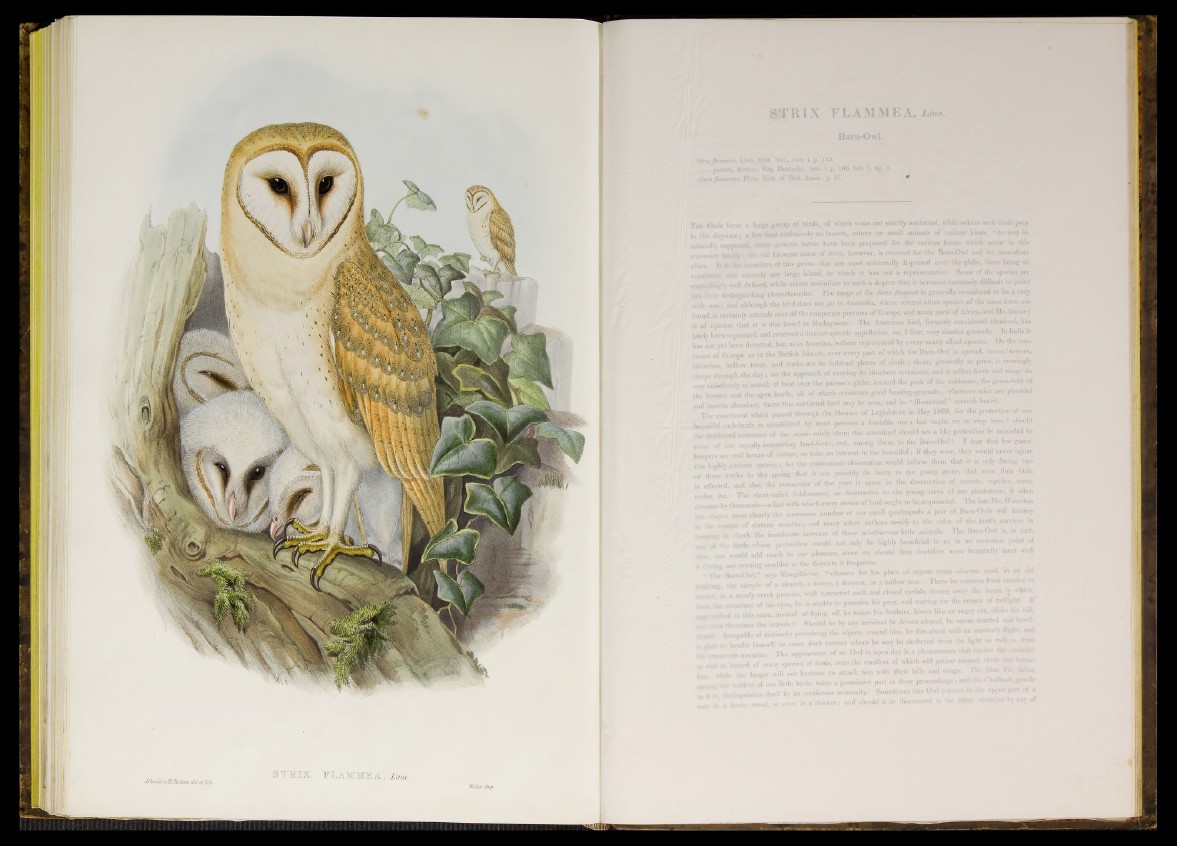
Jùmdd/&ECRidua\ d d et/lìth S T XXX FLAM MEA , limi
l i l A
AUico fiammeus. Fleto. Hieft. of Brit. Anim.
h e Owls form a large g ro u p of birds, o f which some are stric tly noctui
i the daytime; a few feed exclusively on insects, others on small animal
aturally supposed, » a n y generic terms have been proposed for th e var ; forn
keepers
jinoean name of Strix, however, is retained for th e Barn-Owl and its immediate
allies. It i» th e members of this genus that are most universally dispersed over the globe, there being no
continent, and scarcely any large island, in which it lias not a representative. Some of the species are
exceedingly well defined, while others assimilate to such a degree that it becomes extremely difficult to point
(Hit their distinguishing characteristics. The range o f the S trix flaitmea is generally considered to be a very
wide o n e ; and although the bird does not go to Australia, where several other species o f the same form are
found, it certainly extends over all the temperate portions o f Europe, and many parts of Africa, and Mr. Gurney
is of opinion that it is also found in Madagascar. The American bird, formerly considered identical, has
lately been separated, and received a distinct specific appellation, on, I fear, very slender grounds, in India it
has not yet been detected, but, as in America, is there represented by a very nearly allied species. On the continent
o f Europe as in the British Islands, over every part o f which the Barn-Owl is spread, barns,'towers,
churches, hollow trees, and rocks are its habitual places of abode; there, generally in pairs, it snoringly
steeps through the day; on the approach o f evening its slumbers terminate, and it sallies forth and wings its
way noiselessly in search of food over the parson’s glebe, around the park of the nobleman, the grass-ficld of
the farmer, and the open heath, all of which constitute good hunting-grounds; wherever mice are plentiful
and Insects abu n d an t, there this nocturnal bird may he seen, and its “ ill-omened screech heard.
The enactment which passed through the Houses o f Legislature in May 1869, for the protection of our
beautiful rock-birds is considered by most persons a laudable o n e ; but ought we to stop h ere? should
\ <- feathcml creatures o f the ocean solely claim this attention? should not a like protection be accorded to
«amc of our equally interesting land-birds, and, among them, to the Barn-Owl ? I fear that few game-
I lovers of nature, o r take an interest in the beautiful; if they were, they would never injure
nos species • for the commouest observation would inform them that it is only during two
i in th e spring that it can possibly do harm to the young game, that even then little
I that the remainder o f the year is spent in the destruction of insects, reptiles, mice,
he short-tailed field-mouse, so destructive to the young trees o f our plantations, it often
sands a fact with which every owner o f land ought to be aequaiuted. The late Mr. Waterton
it clearly the enormous number o f our small quadrupeds a pair of Barn-Owls will destroy
of sixteen months; and mauy other authors testify to the value of the bird’s services in
•ck the inordinate increase o f these mischievous little animals. The Barn-Owl is, in fact,
ds whose protection would not only be highly beneficial to us in an economic point of
Id add much to our pleasure, since we should then doubtless more, frequently meet with
vening rambles in the districts it frequents.
Owl,” says Macgillivray, “ chooses for his place o f repose some obscure nook in an old
iteeple o f a church, a tower, a dovecot, o r a hollow tree. There he remains from sunrise to
1 erect posture with retracted n e c k a n d closed eyelids, dozing away the hours in which,
e o f his eves he is unable to perceive his prey, and waiting for the return o f twilight If
tl i state instead o f flying off, he raises his feathers, hisses like an angry cat, clicks his drill,
L n- the intruder. Should he by any accident be driven abroad, he seems dazzled and bcwil-
II f distinctly perceiving the objects around him, he flits about with an unsteady flight, and
[ himself to some dark retreat where he may be sheltered from the light as well a* from
[ 'rh e appearance o f an Owl in open day is a phenomenon that excites the cnnouty
I*« r species of birds, even the smallest of which will gather around, chide and barns.«
r iarirer w\\\ not hesitate to attack him with their bills and wings. TW Blue Tit, being
IT . c little birds, takes a prominent part in these proceedings; and rr Chai
e upper pai
m m